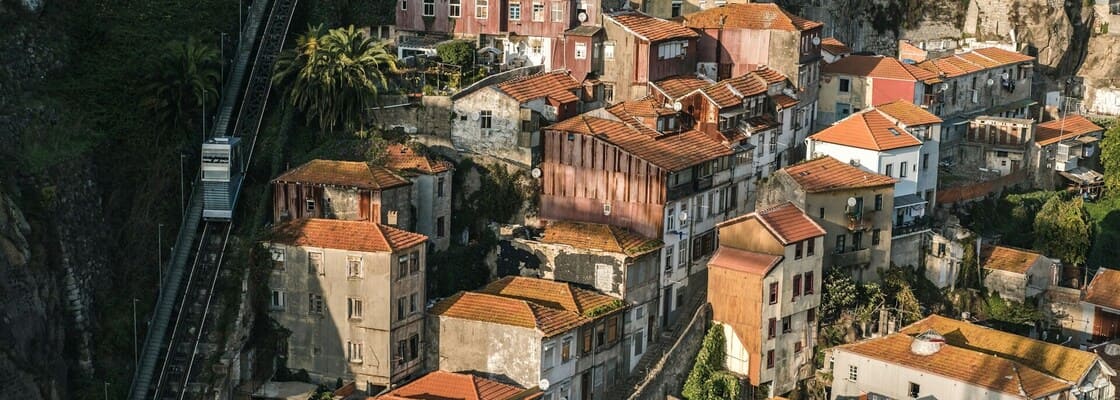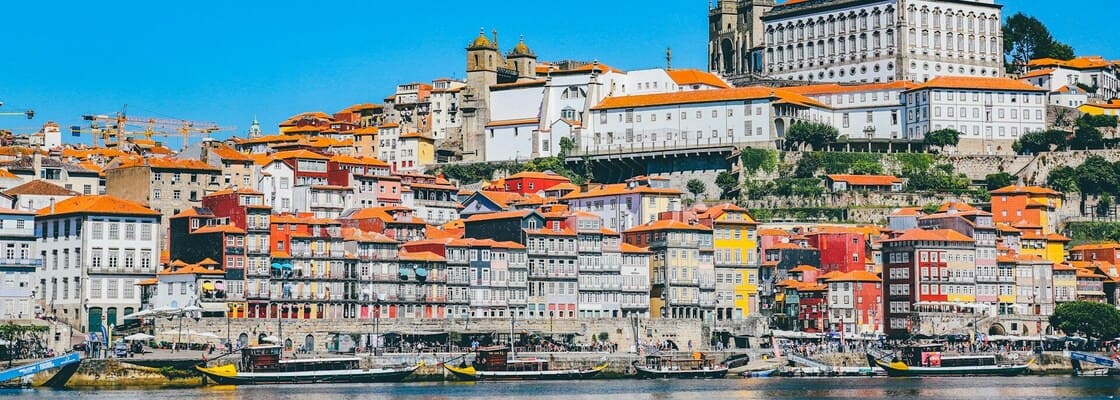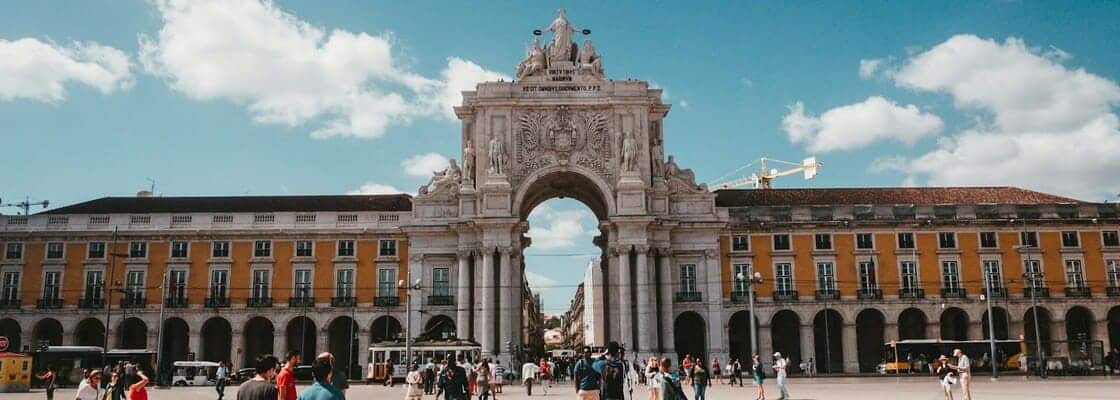Curious about what it’s really like to be living in Portugal? You’re in the right place! We’re here to break down everything you need to know—from the sunny weather and visa requirements to the lifestyle and opportunities that make Portugal so special. Whether you’re dreaming of relocating or just exploring your options, we’ve got you covered with all the essentials in a quick, easy guide. Let’s dive in!

Why live in Portugal?
Let’s take a look at the whole picture and uncover some of the pros and cons of living in Portugal.
Benefits of living in Portugal:
- Really great weather
- Relaxed lifestyle
- Beautiful beaches
- Historic cities celebrating Portuguese culture
- Friendly hospitality
- Great healthcare system
- Low crime rates
- Affordable cost of living
- Delicious food
- Great Portuguese universities
- Daily opportunities
- Constant development in tech innovation and infrastructure
- Welcoming country
- Lots of English-speaking locals
- Great for living or visiting
Some of the disadvantages of life in Portugal double as its benefits, such as the climate or the pace of life there. Here are some of the main disadvantages you may experience living in Portugal as a foreigner:
Disadvantages of living in Portugal
- High costs of housing in central Lisbon and Porto
- The slower pace of life is not for everyone
- The need to learn basic Portuguese if you’re not in one of the more popular expat cities or regions
- Difficulties with paying by card as not all stores accept Visa and Mastercard (you’ll need to carry cash)
- There is little central heating in older houses
- The ocean can get cold
- Job market is competitive in some industries
- 300 days of sunshine (if you’re the rainy type of person)

Living in Portugal
Between the cost of living, the property market, and the weather, living in Portugal becomes even more enjoyable when you know what to expect. Let’s break down what you need to know.
Location and weather
As you might already know, Portugal is a country located on the south-west coast of Europe, between the Atlantic Ocean and Spain. In the last few years, it has been known for its flourishing economy and rising popularity among tourists. That’s hardly a surprise, given the magnificent weather you can experience in Portugal almost all year long. Some say that the sun shines 300 days a year in Portugal. That’s something, right?
In addition to the amazing weather, there are numerous things that contribute to Portugal being one of the best countries to visit and to live in. We will describe them below, but keep in mind that more and more celebrities are developing an interest in living in Portugal, mainly because it is such a good place to enjoy a quiet and peaceful life.

Cost of living in Portugal
Generally speaking, the low cost of living makes Portugal worth it. It can be difficult to save money for a single person earning €820 per month (minimum national wage). However, if you take a few minutes and do the math, you should conclude that everything, like rent, the cost of the majority of the services you need to pay in a household, food, transportation and going out is generally cheaper in Portugal than in the rest of southern and western Europe.
For example, let’s consider some numbers we have prepared for you in order to make it easier to visualize. These numbers are based on a 2-person household with no children.
- Housing could cost anywhere from €600 to €2,000 for rent or mortgage payments (this could also be more, or less, than this range, depending on where you live and the type and size of your property)
- Household services such as water, electricity, gas, TV, Internet, and communications will cost about €114 per month
- Food will take about €400 a month from your budget
- Public transportation, on average, will be about €40 per person each month (€80 for two people)
- Going out (occasionally) could cost each of you about €80 a month, but be careful because it can easily escalate
- Healthcare system, about €20 on average per month (this will increase if you opt for private healthcare insurance)
- Annual cost of clothing might be €500, so about €40 a month for each person
As you can see, two people would spend about €1,530 a month living comfortably if we assume housing costs about €800 per month in this scenario. That translates to about €765 per person per month.
Of course, if you decide to avoid public transportation and buy a car, these numbers will increase, mainly because of the cost of fuel in Portugal and the costs of owning a car in general. Keep in mind that although more expensive than public transport, owning a car is more convenient if you are looking to live in or explore the quieter areas of Portugal or the secluded beaches that public transport might not reach. It is, however, up to you and the lifestyle you choose.

Renting vs buying
The age-old debate when it comes to property: Rent or buy? If you want our opinion, we think buying is better. Especially if A: You have a clear idea of where you want to live, B: Plan on living in Portugal long term, and C: Can afford it. A closer look at Portugal’s real estate industry will show you that buying a home is a great investment, where you’re likely to see the value of the property increase over time with the growing demand.
However, if you’re uncertain about where in Portugal you want to live or do not plan on living in the country long-term, renting gives you time to explore your options.
Mortgage options
Want to buy property but need a mortgage? No need to worry. You can get a mortgage in Portugal quite easily with the help of a mortgage broker, and interest rates in the country are quite favorable, normally ranging between 3 and 5 percent (depending on your financial situation and the market).
The most popular mortgage options available are variable-rate mortgages (with interest rates that fluctuate based on market conditions) and fixed-rate mortgages (with a stable interest rate for the entire loan term and predictable monthly payments)

Real estate agents
If you are planning to purchase property and are not too familiar with the process to follow, working alongside a real estate agent or a buyer’s agent is a good idea. They will ensure there are no fumbles along the way delaying the process.
What’s great about a buyer’s agent over a real estate agent is that the buyer’s agent works on behalf of the buyer (you) instead of the seller of the house. This means they take only what you are looking for into account and won’t try to sell you a home you don’t want simply because it is one of their listings. Check out Goldcrest, Portugal’s first buyer’s agent and an industry leader, to see what they can do for you.

Popular Regions to Live in Portugal
Portugal can be a pretty big place if you’re unfamiliar with the country and not sure where you would enjoy living. If you’re not clued up on the major cities and buzzing regions, don’t worry. Here’s our breakdown of the best cities to live in Portugal for expats.
Lisbon
Living in Lisbon is similar – it is all about vibrant culture and sunny days. Almost everything that happens in Portugal, happens in Lisbon. Being the country’s capital, it is known to have a greater number of job offers, investment opportunities, as well as many places to visit and plenty of sights to see.
Whether you’re wandering through the historic streets of Alfama, catching the sunset at Miradouro de Santa Catarina, or enjoying the buzzing nightlife in Bairro Alto, there’s always something happening. For families, the city offers great schools like the British School of Lisbon. With its laid-back vibe, stunning coastal views, and endless things to do, it’s no wonder Lisbon is a top pick for expats.
For more about Lisbon, see our article: Visit Lisbon.
Property prices in Lisbon
The average price of a home in the Lisbon Municipal Area is €4,061 per square meter. Homes in Lisbon tend to be on the pricier side, as you would expect from the country’s capital. You’ll need to pay a bit more to be closer to the action. But the great thing is that property is in high demand in the area, so buying property here is a great investment overall.
Porto
Living in Porto brings the best of both worlds with old-world charm and modern living. Colorful streets of Ribeira. Amazing views of the Douro River. Sipping Port wine. What’s not to love? Living in Porto gives you access to iconic spots like the Dom Luís I Bridge or the Insta-famous Livraria Lello bookshop.
For families, Oporto British School is a great schooling option. The city’s job scene is also booming, especially in tech and tourism. With an affordable lifestyle, it’s easy to see why expats and young professionals are loving life here!
Property prices in Porto
In Porto’s Municipal Area, you can find property prices averaging €3,291 per square meter. Porto’s properties are cheaper than Lisbon’s, while still offering a trendy hub for expats. Not a bad option for savvy property buyers.
Algarve
Living in the Algarve region is all about sun, sea, and a laid-back lifestyle. Known for its golden beaches, clear waters, and stunning cliffs, it’s a paradise for beach lovers. Whether you’re exploring charming fishing villages, hitting the golf courses, or enjoying fresh seafood by the ocean, there’s always something to do.
Great schools like Nobel International School cater to families, and with a growing expat community, it’s easy to feel at home. The Algarve also offers opportunities in tourism and hospitality, making it a great spot for those seeking a good work-life balance in a coastal setting.

Property prices in the Algarve
Property prices average €3,897 in this region, which is not a bad price for beachfront properties (although these property types usually fetch a higher price, you can still find a good deal here and there).
Cascais
Living in Cascais is a little more upscale if you have a few extra bucks to spend. Just a short drive from Lisbon, this seaside town is known for its stunning beaches, world-class restaurants, and relaxed vibe. Picture strolling along the marina, surfing at Guincho Beach, or enjoying the lush parks, Cascais has plenty to offer.
For families a school like St. Julian’s School makes and excellent choice, and the vibrant expat community makes it easy to settle in.
Property prices in Cascais
An upscale area comes with upscale property prices. Cascais properties go for an impressive average of €5,835 per square meter, but you do get your money’s worth at the end of the day. Properties in the area tend to be larger with luxurious amenities and a stylish flair.

Healthcare System
Portugal has one of the most inclusive public healthcare systems in the world. It doesn’t really matter where you are from, if you need to go to a doctor or an emergency room, you will not be asked to pay more than a local, which will cost around €5 for a doctor’s visit or around €20 for the emergency room. Medication in Portugal is also substantially subsidized and quite affordable.
In most cases, if you live in Portugal and have a National Identification Number (Número de Identificação Fiscal or NIF, issued by the Portuguese tax authority), a European health insurance card, and a Portugal Social Security number (Número de Identificação de Segurança Social or NISS), part of your prescription drugs will be covered by the Portuguese National Health Service (Serviço Nacional de Saúde or SNS), just as if you were a Portuguese citizen.
However, expats tend to favor taking out Portugal’s affordable private health insurance and using private healthcare options. The private healthcare system tends to offer faster services, and you’ll generally find more healthcare professionals who speak English fluently (not to say you won’t find them in the public network!)
Portugal’s hospitals, clinics, and pharmacies are pretty impressive overall. You’ll find modern hospitals and clinics packed with the latest medical tech and staffed by skilled professionals. Sure, public hospitals can get busy, but they still deliver solid care and offer a wide range of services, including specialized treatments.

Is Portugal safe?
In short, yes. According to the 2024 Global Peace Index, living in Portugal is considered the seventh safest country in the world. Not bad, huh?

So, who is Portugal for?
Now that we have talked a little about the country, you might wonder if Portugal is the country for you? Well, let’s see. There are many, many people from other countries living in Portugal right now. The total foreign resident population in Portugal was 1,044,606 by the end of 2023 (33.6 percent increase from 2022). We believe this is the first indicator that living in Portugal as an expat is worth it.
Year on year, more people from around the world are attracted to the high quality of life Portugal offers, no matter which stage of life they are in. Let’s see some examples below:
Retiring in Portugal
The fact that Portugal has been on everyone’s lips in the last few years has increased the country’s popularity abroad. The excellent climate, the peaceful life, and the low cost of living in Portugal make it an excellent place to retire. Retirees choose Portugal because of the fiscal benefits, the sunshine, the beaches, and the golf courses that make Portugal feel like Europe’s Florida.
Digital nomads
Another group of people from abroad living in Portugal are the digital nomads, usually taking advantage of Portugal’s digital nomad visa. Although they are always on the move, the fact that the cost of living in Portugal is low and the opportunities in the country are plenty, digital nomads tend to stay in Portugal for some time. If that’s your case, we really appeal to you to consider Portugal for a while.
As we mentioned before, Portugal is a country with a steadily increasing economy and opportunities, so you should really give it a try. Not to mention the fact that Portugal is the home to the annual Web Summit technology conference!
Students
Portugal has one of the oldest universities in Europe: the University of Coimbra. In addition, there are many, many more in Lisbon, Porto, Covilhã, Faro, and Aveiro, among other places. But don’t think that a large number of universities in such a small country translates to a poorer quality of teaching because it doesn’t. The University of Porto and the University of Lisbon are both ranked among some of the best institutions in an EU country.
Portugal is known to have (and to make) excellent professionals, and it is one of the reasons so many young and recent graduates are recruited by international businesses and companies. There are a lot of college students who experience living in Portugal for a semester or two, hoping to get the best out of the good weather and the excellent university services.
Working life in Portugal
Working in Portugal usually means working between 35 to 40 hours a week if you have a job with a fixed schedule. Usually, places and services open at 9 am and close at 7 pm or even later.
Working on the weekends can happen depending on the type of work you do and the service the business offers.
Show me the money
In terms of salaries, it depends if you’re working on your own or for a third party. If your money comes from a company, the very least you will earn is €820. That’s the minimum national wage. However, the average income after taxes in Portugal in 2024 is about €1,250, and it seems to be rising, with international companies often paying more.
If you are an entrepreneur or working on your own and you earn your own money by selling your services, the numbers may be a little different. It is up to you how many hours you put in, but one thing is for sure: Given the numerous opportunities Portugal offers, you could earn really nice amounts of money. You just have to get familiar with the market. The sky’s the limit!
What do I need to move to Portugal?
After you’ve decided that living in Portugal is for you, you will need to think about the legal aspects of the process. If you are a citizen of the European Union, Switzerland, or the Schengen Area, you have the right to move to Portugal whenever and wherever you want. If you want to exceed living in Portugal for three months, you just have to go to your local city hall and register yourself by stating where you will live. You will then receive a certificate. You will also need to apply for your own personal tax number (NIF) from your local tax office and opening a local bank account will help you save on costs.
If you are from the US, UK, Canada, Australia or New Zealand, you can also enter and stay living in Portugal for three months within a six-month period without having to apply for a visa. You will have to apply for a visa if you wish to stay more than 90 days.
Visas for everyone
If you are from outside the EU, you can apply for a visa to get a Portuguese residence permit before coming to Portugal. The great thing about Portugal is if you end up loving it as much as we do, after five years of residency, you can apply for Portuguese citizenship.
The Portuguese government offers multiple types of visas you can obtain, depending on your situation:
- If you would like to live in Portugal to be an entrepreneur and invest in activities in Portugal, check out the Portugal D2 Visa.
- To live in Portugal on passive income you are earning from invested money, housing markets, and others, or if you are simply retired and wish to live on your retirement pension in Portugal, the D7 Visa is for you.
- If you are a digital nomad earning at least four times the minimum wage in Portugal (€820) and working for a non-Portuguese company, you could qualify for the D8 Visa.
- Finally, if you really want to invest in Portugal’s economy and cultural development, you should definitely take a look at the Portugal Golden Visa program. However, bear in mind that the Portugal Golden Visa requires a minimum investment of €250,000.
So, that’s basically it. As you probably gathered by now, if you are looking for something new, consider living in Portugal as an expat. You will not regret it!
Did you enjoy learning about life in Portugal? Did we miss anything? Do you have any experiences to share? Feel free to leave a comment below. We publish new content often so be sure to subscribe to our newsletter to get notified of the latest tips for your visit to Portugal.
You might also be interested in:
Moving to Portugal, a Guide to Visas, Documents and Regulations
How to Get Portuguese Residency for Non-EU Citizens
Frequently Asked Questions About Living in Portugal
What is it like living in Portugal as an expat?
Living in Portugal as an expat offers a relaxed, affordable lifestyle with a sunny climate and a growing, welcoming expat community. Cities like Lisbon, Porto, and the Algarve provide a great mix of culture, modern conveniences, and coastal beauty, while the efficient healthcare system and friendly locals make settling in easy.
Is living in Portugal expensive?
Living in Portugal is generally affordable compared to other European countries. While costs can be higher in cities like Lisbon, Porto, or the Algarve, especially for housing, overall expenses like groceries, dining, and utilities are relatively low. In smaller towns and rural areas, the cost of living is even more budget-friendly, making Portugal an attractive option for expats and retirees looking for a good quality of life at a reasonable price. Opening a local bank account will also help save on transaction costs along the way.
Is Portugal a good place to live for retirees?
Yes, Portugal is a fantastic place for retirees. It offers a warm climate, a relaxed pace of life, and an affordable cost of living. The country has a high-quality, reliable healthcare system, beautiful landscapes from beaches to countryside, and a rich cultural scene. Retirees will also be able to find some world-class retirement villages in Portugal if looking for a tailored retirement experience.
What are the best cities in Portugal to live in?
Some of the most popular cities for expats include Lisbon, Porto, Faro, and Cascais. All these locations offer the best of Portugal: Warm weather, stunning beaches and natural landscapes, rich culture, a strong expat community, excellent restaurants and a wide range activities to enjoy, from golfing to water sports.
How is the healthcare system in Portugal for expats?
Portugal has a reliable public healthcare system and excellent private healthcare options. The public healthcare system is well run, and treatments are mostly free or require a minimal cost. The private healthcare system is also affordable, with health insurance plans starting at around €30, and treatments are significantly cheaper than other Western European countries and countries like the USA. If you’re living in Portugal as an American, you’ll be paying a small fraction of the costs you would be paying in the United States.
How is the weather in Portugal throughout the year?
Portugal has a pleasant climate, with warm, sunny weather throughout most of the year. However, as a Mediterranean climate, Portugal can get a little chilly and rainy during the winter season in some areas, but bundling up in a warm jacket and investing in heating in your home will be more than enough to keep you warm.
Is Portugal safe to live in?
Yes, Portugal is a very safe country to live in. According to the 2024 Global Peace Index, Portugal is considered the seventh safest country in the world.
Are there good international schools in Portugal?
Yes, Portugal has several excellent international schools, especially in major cities like Lisbon, Porto, and the Algarve. These schools offer high-quality education with internationally recognized curricula. Some top international schools in Lisbon, Porto, and the Algarve include:
- St. Julian’s School in Lisbon
- The British School of Lisbon
- Oporto British School in Porto
- Nobel International School Algarve
Can I live in Portugal without speaking Portuguese?
Yes, in the cities with a large expat population, like Lisbon and Porto, you’ll find the majority of the Portuguese people speak English well and you should be able to get by without speaking Portuguese. However, it will be useful to learn the basics of the Portuguese language when traveling to more remote areas.
What are the best places to live in Portugal for digital nomads?
Lisbon and Porto are quite popular among digital nomads, who enjoy the convenience of the large expat community, the tech innovation, the modern culture, the buzzing nightlife, and the coworking spaces.
How is the food in Portugal?
The food in Portugal is delicious, fresh, and diverse, with a strong emphasis on seafood, given the country’s coastal location. However, you’ll be able to find a mix of dishes to suit any taste and prepared to perfection. In fact, Lisbon was recently awarded Europe’s best culinary city destination at the annual World Culinary Awards, making it a must-visit city for all foodies.







